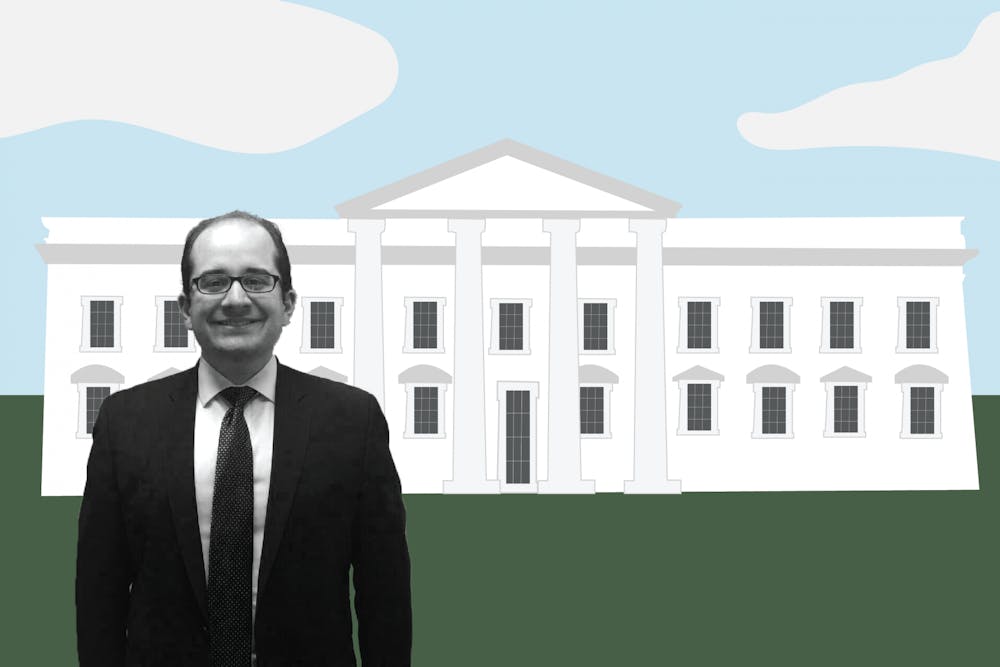Smiling fondly, Penn alumnus Ted Koutsoubas (C ‘12) recalls his experience handing out fliers from his booth on Locust Walk and campaigning door–to–door on campus for a Pennsylvania senatorial campaign. That was 2010. A decade later, the former member of PennDems has pursued his passion for politics and currently holds a position as political advisor at a Washington–based government relations firm where he specializes in the administration of the Medicaid program in state governments.
Admitting that Medicaid isn’t the “sexiest of topics,” Koutsoubas emphasizes that it does directly impact the lives of over seventy million Americans.
“I’m really passionate about helping vulnerable communities—you have to realize, the people that are on Medicaid sometimes can’t go to the bathroom by themselves, or can’t feed themselves,” he explains. “They have very serious chronic conditions. They’re often very poor—some of the poorest in our country.”
The political consultant’s job is to effectively convey the complexities and consequences of different healthcare policies to his politician clients. Navigating the United States’ labyrinth healthcare system is quite a challenge, especially when each state has its own unique program. Acknowledging the inherent difficulty of his job, Koutsoubas shares a classic Medicaid joke: “If you’ve seen one Medicaid program, you’ve only seen one Medicaid program.”
To the alumnus of the Daily Pennsylvanian, all of the bureaucratic difficulties are worth it when he thinks of giving someone the security of medical coverage.
“I'm a first–generation American. My parents came to this country from Greece. I’m one–generation removed from being born on a dirt floor, but I’ve been lucky enough to go to Penn and kind of live the American Dream,” he reflects. “A lot of people don’t have that opportunity yet … I’m proud of getting people more healthcare coverage and making sure the health coverage they’re getting can help them get a leg up.”
Koutsoubas' Greek–American family heritage has had a significant impact on his worldview. He explains: “The ancient Greeks have two words for time. There’s the current time … what am I going to have for lunch, it’s 2:26pm, what’s going on right now. And then there’s time, which is what happens five or ten years from now.” The latter word for time governs his goals in life and his approach to politics.
In fact, one of the alumnus’ greatest pet peeves from working in Washington is when a political candidate obsesses over climbing the political ladder instead of focusing on the futures of their current constituents. “I mean, really?” he exclaims in disbelief. “How about we talk about what’s going to happen in your community for the next two years? Or for a governor—what’s going to happen in your state for the next four years? Let’s not talk about you running for something else, let’s focus on the here and now and what you want people to think about us as a community.”
It comes as no surprise that when asked about what he looks for in a political candidate, Koutsoubas looks for more than ambition. He wants someone with a political vision. With a sense of time.
The Vice President of the Penn Alumni Club of D.C. developed his personal vision for a career in politics at the age of fifteen, when he first got involved in a campaign. And now? School board, town council, state government, the Senate, you name it—Koutsoubas has experience supporting political candidates in every level of government.
“Local issues are the most fun, frankly, because that’s where you can make the most impact.” The New Jersey native recommends for people to “start at the local level, because that’s where the rubber hits the road.”
He adds: “Unfortunately, a lot of people now view politics as this very dirty game. I think the more local you go, the less of that you see ... you see people wanting to help each other because they know each other—no one’s going to yell at their neighbor.”
That’s why the political campaign veteran wants to make it clear that politics isn’t just about what’s happening in Washington. “People can get really discouraged about politics when they see what’s happening in D.C.,” Koutsoubas cautions. “They need to focus on what’s happening in Trenton, or Harrisburg, and in their local communities and get engaged.”

